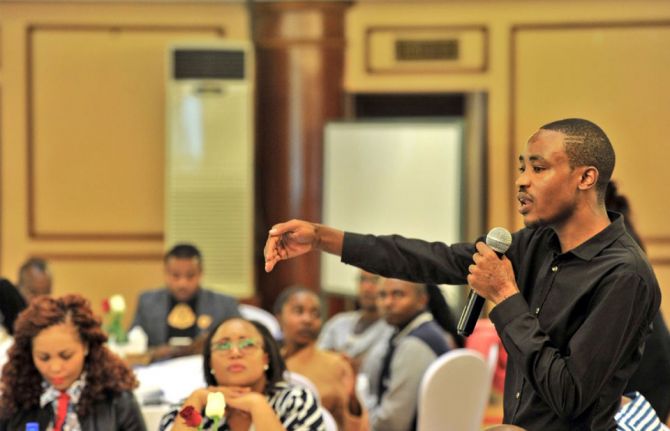

Feature Story
Vibrant civil society remains at heart of the HIV response in Kenya
29 May 2018
29 May 2018 29 May 2018Civil society has played an important role in the response to HIV since the very beginning of the epidemic, calling for access to life-saving medicines, demanding the rights of people living with and affected by HIV and providing critical HIV prevention, care and support. Without civil society, fewer HIV services would be available, particularly to marginalized populations and to people in remote areas.
On a recent visit to Kenya, the Executive Director of UNAIDS, Michel Sidibé, met with members of civil society organizations in Kenya to talk about how to support, reinforce and expand the contribution of civil society towards ending the AIDS epidemic.
“We need a new narrative, not only about HIV treatment but how to restore people’s dignity,” said Mr Sidibé. “We need to demonstrate that no one can better deliver on universal health care than civil society organizations.”
Community responses to HIV result in better health, foster community resilience and are cost-effective. Civil society also needs to be fully involved in decision-making processes to help its work in ensuring respect for human rights, achieving gender equality and diversity and ensuring that no one is left behind.
Wanjiru Mukoma, the Executive Director of Liverpool VCT Health, a Kenyan civil society organization that provides HIV prevention, testing, care and treatment services, facilitated the meeting. She said, “We are at the point where we must frame the HIV agenda. The HIV response cannot be effective without a vibrant civil society.”
The participants asserted that the focus must shift from building the capacity of civil society to meaningful investment in existing capacity in order to increase the impact of its work in the AIDS response.
“Civil society organizations have done a lot of work, but credit does not go to us. We need support to document our work and build our capacity to establish robust monitoring systems of our contribution to Fast-Track,” said Dorothy Onyango, the Executive Director of Women Fighting AIDS in Kenya.
Ensuring the meaningful participation of young people in civil society spaces was also stressed. “We do not want the young at heart to represent us; we are asking for spaces to represent ourselves. We have capacity,” said Joyce Amondi, a young person at the meeting.
During the day, Mr Sidibé also met with Sahle-Work Zewde, the Director-General of the United Nations Office at Nairobi, to discuss sustainability planning to maintain and accelerate the remarkable results that Kenya has achieved towards achieving the 90–90–90 targets, whereby, by 2020, 90% of people living with HIV know their HIV status, 90% of people who know their HIV-positive status are accessing treatment and 90% of people on treatment have suppressed viral loads. They agreed that decentralizing service delivery systems, cutting user fees and stopping the use of falsified medicines would be transformative for the AIDS response in Kenya.
UNAIDS is committed to the meaningful and inclusive participation of civil society at all levels of the AIDS response. By integrating community responses into national AIDS plans and Global Fund to Fight AIDS, Tuberculosis and Malaria concept notes, including budget allocations, UNAIDS supports the funding, development, implementation and monitoring of community service delivery programmes, civil society organizations, advocacy organizations and community networks.
UNAIDS brings civil society organizations together with governments and donors to develop plans, strategies and programmes, review legal and policy environments and respond to emergency and human rights issues. UNAIDS supports civil society organizations to engage in the AIDS response in a coordinated way that respects diverse voices and actions, facilitating civil society advocacy and community-based service delivery.
Region/country
Related
 “Who will protect our young people?”
“Who will protect our young people?”

02 June 2025
 Impact of US funding cuts on HIV programmes in Kenya
Impact of US funding cuts on HIV programmes in Kenya

04 April 2025
 Impact of US funding cuts on HIV programmes in Kenya
Impact of US funding cuts on HIV programmes in Kenya

01 April 2025
